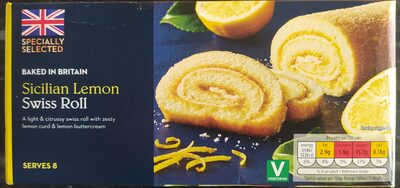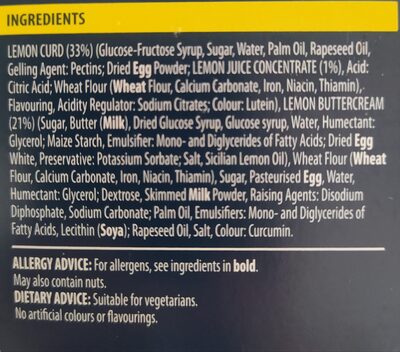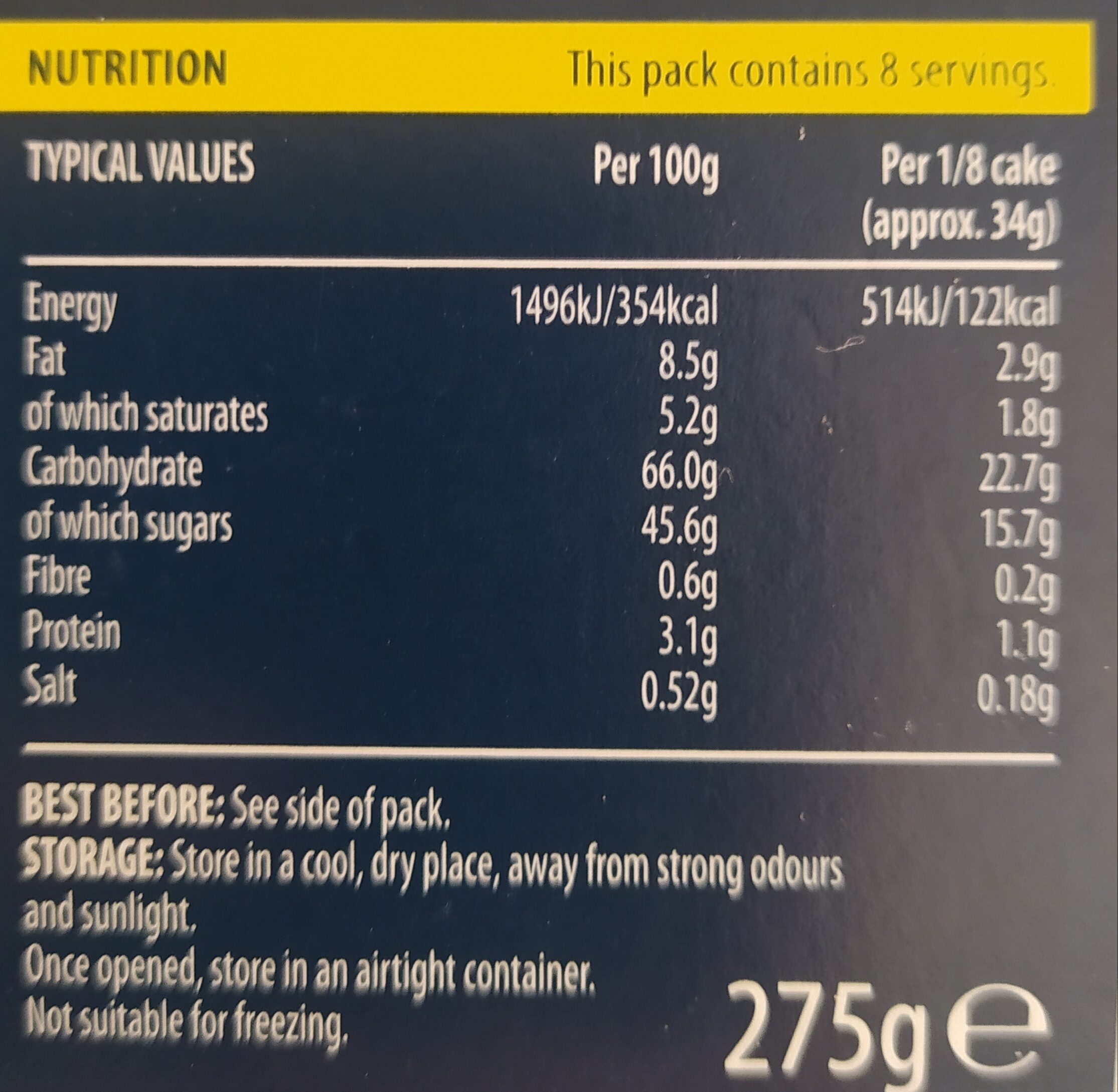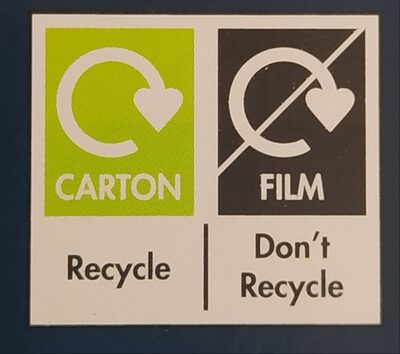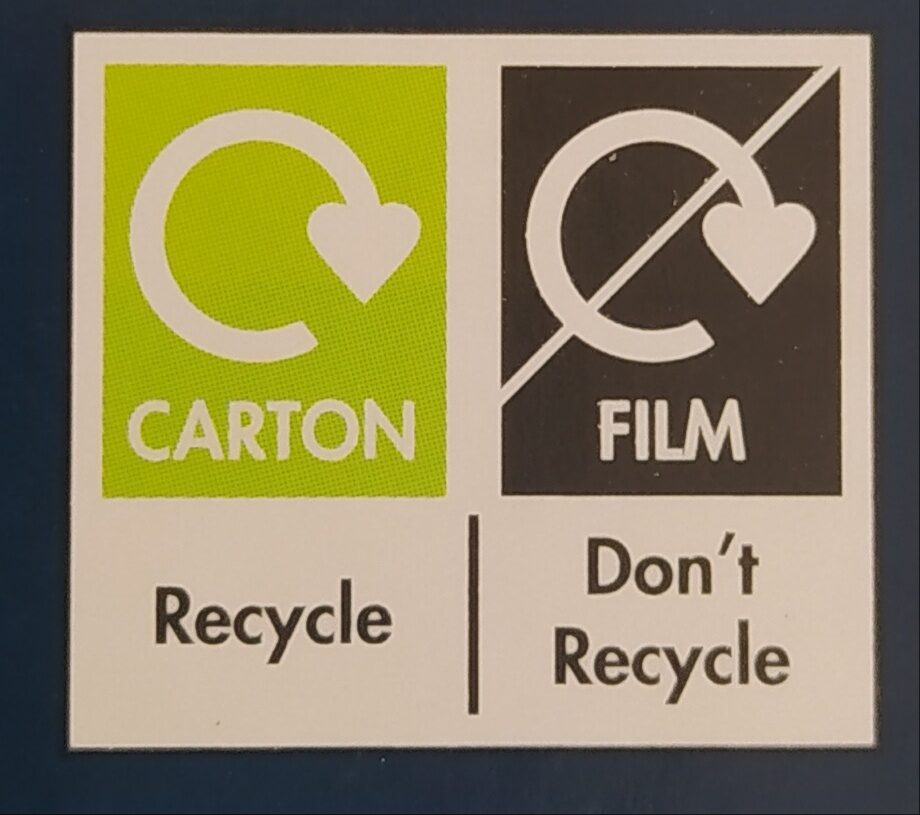Help us make food transparency the norm!
As a non-profit organization, we depend on your donations to continue informing consumers around the world about what they eat.
The food revolution starts with you!
Sicillian Lemon Swiss Roll - Specially Selected - 275g
Sicillian Lemon Swiss Roll - Specially Selected - 275g
This product page is not complete. You can help to complete it by editing it and adding more data from the photos we have, or by taking more photos using the app for Android or iPhone/iPad. Thank you!
×
Barcode: 4088600042190 (EAN / EAN-13)
Quantity: 275g
Brands: Specially Selected
Categories: Snacks, Desserts, Sweet snacks, Biscuits and cakes, Cakes, Filled-sponge-cake-rolls
Labels, certifications, awards: Vegetarian, No artificial flavors, No artificial colors, No artificial colours or flavours
Stores: Aldi
Countries where sold: United Kingdom
Matching with your preferences
Health
Ingredients
-
63 ingredients
LEMON CURD (33%) (Glucose-Fructose Syrup, Sugar, Water, Palm Oil, Rapeseed Oil, Gelling Agent: Pectins; Dried Egg Powder; LEMON JUICE CONCENTRATE (1%), Acid: Citric Acid; Wheat Flour (Wheat Flour, Calcium Carbonate, Iron, Niacin, Thiamin), Flavouring, Acidity Regulator: Sodium Citrates; Colour: Lutein), LEMON BUTTERCREAM (21%) (Sugar, Butter (Milk), Dried Glucose Syrup, Glucose syrup, Water, Humectant: Glycerol; Maize Starch, Emulsifier: Mono - and Diglycerides of Fatty Acids; Dried Egg White, Preservative: Potassium Sorbate; Salt, Sicilian Lemon Oil), Wheat Flour (Wheat Flour, Calcium Carbonate, Iron, Niacin, Thiamin), Sugar, Pasteurised Egg, Water, Humectant: Glycerol; Dextrose, Skimmed Milk Powder, Raising Agents: Disodium Diphosphate, Sodium Carbonate; Palm Oil, Emulsifiers: Mono - and Diglycerides of Fatty Acids, Lecithin (Soya); Rapeseed Oil, Salt, Colour: Curcumin.Allergens: Eggs, Gluten, Milk, Soybeans
Food processing
-
Ultra processed foods
Elements that indicate the product is in the 4 - Ultra processed food and drink products group:
- Additive: E100 - Curcumin
- Additive: E161b - Lutein
- Additive: E322 - Lecithins
- Additive: E422 - Glycerol
- Additive: E440 - Pectins
- Additive: E450 - Diphosphates
- Additive: E471 - Mono- and diglycerides of fatty acids
- Ingredient: Colour
- Ingredient: Dextrose
- Ingredient: Emulsifier
- Ingredient: Flavouring
- Ingredient: Gelling agent
- Ingredient: Glucose
- Ingredient: Glucose syrup
- Ingredient: Humectant
Food products are classified into 4 groups according to their degree of processing:
- Unprocessed or minimally processed foods
- Processed culinary ingredients
- Processed foods
- Ultra processed foods
The determination of the group is based on the category of the product and on the ingredients it contains.
Additives
-
E202 - Potassium sorbate
Potassium sorbate (E202) is a synthetic food preservative commonly used to extend the shelf life of various food products.
It works by inhibiting the growth of molds, yeast, and some bacteria, preventing spoilage. When added to foods, it helps maintain their freshness and quality.
Some studies have shown that when combined with nitrites, potassium sorbate have genotoxic activity in vitro. However, potassium sorbate is generally recognized as safe (GRAS) by regulatory authorities.
-
E322 - Lecithins
Lecithins are natural compounds commonly used in the food industry as emulsifiers and stabilizers.
Extracted from sources like soybeans and eggs, lecithins consist of phospholipids that enhance the mixing of oil and water, ensuring smooth textures in various products like chocolates, dressings, and baked goods.
They do not present any known health risks.
-
E322i - Lecithin
Lecithins are natural compounds commonly used in the food industry as emulsifiers and stabilizers.
Extracted from sources like soybeans and eggs, lecithins consist of phospholipids that enhance the mixing of oil and water, ensuring smooth textures in various products like chocolates, dressings, and baked goods.
They do not present any known health risks.
-
E330 - Citric acid
Citric acid is a natural organic acid found in citrus fruits such as lemons, oranges, and limes.
It is widely used in the food industry as a flavor enhancer, acidulant, and preservative due to its tart and refreshing taste.
Citric acid is safe for consumption when used in moderation and is considered a generally recognized as safe (GRAS) food additive by regulatory agencies worldwide.
-
E331 - Sodium citrates
Sodium citrate: Sodium citrate may refer to any of the sodium salts of citrate -though most commonly the third-: Monosodium citrate Disodium citrate Trisodium citrateThe three forms of the salt are collectively known by the E number E331. Sodium citrates are used as acidity regulators in food and drinks, and also as emulsifiers for oils. They enable cheeses to melt without becoming greasy.Source: Wikipedia
-
E422 - Glycerol
Glycerol: Glycerol -; also called glycerine or glycerin; see spelling differences- is a simple polyol compound. It is a colorless, odorless, viscous liquid that is sweet-tasting and non-toxic. The glycerol backbone is found in all lipids known as triglycerides. It is widely used in the food industry as a sweetener and humectant and in pharmaceutical formulations. Glycerol has three hydroxyl groups that are responsible for its solubility in water and its hygroscopic nature.Source: Wikipedia
-
E440 - Pectins
Pectins (E440) are natural carbohydrates, predominantly found in fruits, that act as gelling agents in the food industry, creating the desirable jelly-like texture in jams, jellies, and marmalades.
Pectins stabilize and thicken various food products, such as desserts, confectioneries, and beverages, ensuring a uniform consistency and quality.
Recognized as safe by various health authorities, pectins have been widely used without notable adverse effects when consumed in typical dietary amounts.
-
E450 - Diphosphates
Diphosphates (E450) are food additives often utilized to modify the texture of products, acting as leavening agents in baking and preventing the coagulation of canned food.
These salts can stabilize whipped cream and are also found in powdered products to maintain their flow properties. They are commonly present in baked goods, processed meats, and soft drinks.
Derived from phosphoric acid, they're part of our daily phosphate intake, which often surpasses recommended levels due to the prevalence of phosphates in processed foods and drinks.
Excessive phosphate consumption is linked to health issues, such as impaired kidney function and weakened bone health. Though diphosphates are generally regarded as safe when consumed within established acceptable daily intakes, it's imperative to monitor overall phosphate consumption to maintain optimal health.
-
E471 - Mono- and diglycerides of fatty acids
Mono- and diglycerides of fatty acids (E471), are food additives commonly used as emulsifiers in various processed foods.
These compounds consist of glycerol molecules linked to one or two fatty acid chains, which help stabilize and blend water and oil-based ingredients. E471 enhances the texture and shelf life of products like margarine, baked goods, and ice cream, ensuring a smooth and consistent texture.
It is generally considered safe for consumption within established regulatory limits.
-
E500 - Sodium carbonates
Sodium carbonates (E500) are compounds commonly used in food preparation as leavening agents, helping baked goods rise by releasing carbon dioxide when they interact with acids.
Often found in baking soda, they regulate the pH of food, preventing it from becoming too acidic or too alkaline. In the culinary world, sodium carbonates can also enhance the texture and structure of foods, such as noodles, by modifying the gluten network.
Generally recognized as safe, sodium carbonates are non-toxic when consumed in typical amounts found in food.
-
E500i - Sodium carbonate
Sodium carbonate: Sodium carbonate, Na2CO3, -also known as washing soda, soda ash and soda crystals, and in the monohydrate form as crystal carbonate- is the water-soluble sodium salt of carbonic acid. It most commonly occurs as a crystalline decahydrate, which readily effloresces to form a white powder, the monohydrate. Pure sodium carbonate is a white, odorless powder that is hygroscopic -absorbs moisture from the air-. It has a strongly alkaline taste, and forms a moderately basic solution in water. Sodium carbonate is well known domestically for its everyday use as a water softener. Historically it was extracted from the ashes of plants growing in sodium-rich soils, such as vegetation from the Middle East, kelp from Scotland and seaweed from Spain. Because the ashes of these sodium-rich plants were noticeably different from ashes of timber -used to create potash-, they became known as "soda ash". It is synthetically produced in large quantities from salt -sodium chloride- and limestone by a method known as the Solvay process. The manufacture of glass is one of the most important uses of sodium carbonate. Sodium carbonate acts as a flux for silica, lowering the melting point of the mixture to something achievable without special materials. This "soda glass" is mildly water-soluble, so some calcium carbonate is added to the melt mixture to make the glass produced insoluble. This type of glass is known as soda lime glass: "soda" for the sodium carbonate and "lime" for the calcium carbonate. Soda lime glass has been the most common form of glass for centuries. Sodium carbonate is also used as a relatively strong base in various settings. For example, it is used as a pH regulator to maintain stable alkaline conditions necessary for the action of the majority of photographic film developing agents. It acts as an alkali because when dissolved in water, it dissociates into the weak acid: carbonic acid and the strong alkali: sodium hydroxide. This gives sodium carbonate in solution the ability to attack metals such as aluminium with the release of hydrogen gas.It is a common additive in swimming pools used to raise the pH which can be lowered by chlorine tablets and other additives which contain acids. In cooking, it is sometimes used in place of sodium hydroxide for lyeing, especially with German pretzels and lye rolls. These dishes are treated with a solution of an alkaline substance to change the pH of the surface of the food and improve browning. In taxidermy, sodium carbonate added to boiling water will remove flesh from the bones of animal carcasses for trophy mounting or educational display. In chemistry, it is often used as an electrolyte. Electrolytes are usually salt-based, and sodium carbonate acts as a very good conductor in the process of electrolysis. In addition, unlike chloride ions, which form chlorine gas, carbonate ions are not corrosive to the anodes. It is also used as a primary standard for acid-base titrations because it is solid and air-stable, making it easy to weigh accurately.Source: Wikipedia
Ingredients analysis
-
Palm oil
Ingredients that contain palm oil: Palm oil, Palm oil
-
Non-vegan
Non-vegan ingredients: Egg, Butter, Egg white, Egg, Skimmed milk powderSome ingredients could not be recognized.
We need your help!
You can help us recognize more ingredients and better analyze the list of ingredients for this product and others:
- Edit this product page to correct spelling mistakes in the ingredients list, and/or to remove ingredients in other languages and sentences that are not related to the ingredients.
- Add new entries, synonyms or translations to our multilingual lists of ingredients, ingredient processing methods, and labels.
If you would like to help, join the #ingredients channel on our Slack discussion space and/or learn about ingredients analysis on our wiki. Thank you!
-
Vegetarian
No non-vegetarian ingredients detected
Unrecognized ingredients: Lemon-curd, Iron, Thiamin, Lemon-buttercream, Sicilian-lemon-oil, Iron, ThiaminSome ingredients could not be recognized.
We need your help!
You can help us recognize more ingredients and better analyze the list of ingredients for this product and others:
- Edit this product page to correct spelling mistakes in the ingredients list, and/or to remove ingredients in other languages and sentences that are not related to the ingredients.
- Add new entries, synonyms or translations to our multilingual lists of ingredients, ingredient processing methods, and labels.
If you would like to help, join the #ingredients channel on our Slack discussion space and/or learn about ingredients analysis on our wiki. Thank you!
-
Details of the analysis of the ingredients
We need your help!
Some ingredients could not be recognized.
We need your help!
You can help us recognize more ingredients and better analyze the list of ingredients for this product and others:
- Edit this product page to correct spelling mistakes in the ingredients list, and/or to remove ingredients in other languages and sentences that are not related to the ingredients.
- Add new entries, synonyms or translations to our multilingual lists of ingredients, ingredient processing methods, and labels.
If you would like to help, join the #ingredients channel on our Slack discussion space and/or learn about ingredients analysis on our wiki. Thank you!
en: LEMON CURD 33% (Glucose-Fructose Syrup, Sugar, Water, Palm Oil, Rapeseed Oil, Gelling Agent (Pectins), Egg, LEMON JUICE CONCENTRATE 1%, Acid (Citric Acid), Wheat Flour (Wheat Flour, Calcium Carbonate, Iron, Niacin, Thiamin), Flavouring, Acidity Regulator (Sodium Citrates), Colour (Lutein)), LEMON BUTTERCREAM 21% (Sugar, Butter, Dried Glucose Syrup, Glucose syrup, Water, Humectant (Glycerol), Maize Starch, Emulsifier (mono- and Diglycerides of Fatty Acids), Egg White, Preservative (Potassium Sorbate), Salt, Sicilian Lemon Oil), Wheat Flour (Wheat Flour, Calcium Carbonate, Iron, Niacin, Thiamin), Sugar, Egg, Water, Humectant (Glycerol), Dextrose, Skimmed Milk Powder, Raising Agents (Disodium Diphosphate), Sodium Carbonate, Palm Oil, Emulsifiers (mono- and Diglycerides of Fatty Acids), Lecithin, Rapeseed Oil, Salt, Colour (Curcumin)- LEMON CURD -> en:lemon-curd - percent_min: 33 - percent: 33 - percent_max: 33
- Glucose-Fructose Syrup -> en:glucose-fructose-syrup - vegan: yes - vegetarian: yes - ciqual_food_code: 31077 - percent_min: 2.53846153846154 - percent_max: 26
- Sugar -> en:sugar - vegan: yes - vegetarian: yes - ciqual_proxy_food_code: 31016 - percent_min: 1 - percent_max: 13.5
- Water -> en:water - vegan: yes - vegetarian: yes - ciqual_food_code: 18066 - percent_min: 1 - percent_max: 9.33333333333333
- Palm Oil -> en:palm-oil - vegan: yes - vegetarian: yes - from_palm_oil: yes - ciqual_food_code: 16129 - percent_min: 1 - percent_max: 7.25
- Rapeseed Oil -> en:rapeseed-oil - vegan: yes - vegetarian: yes - from_palm_oil: no - percent_min: 1 - percent_max: 6
- Gelling Agent -> en:gelling-agent - percent_min: 1 - percent_max: 5.16666666666667
- Pectins -> en:e440a - vegan: yes - vegetarian: yes - percent_min: 1 - percent_max: 5.16666666666667
- Egg -> en:egg - vegan: no - vegetarian: yes - ciqual_food_code: 22000 - percent_min: 1 - percent_max: 4.57142857142857
- LEMON JUICE CONCENTRATE -> en:concentrated-lemon-juice - vegan: yes - vegetarian: yes - ciqual_food_code: 2028 - percent_min: 1 - percent: 1 - percent_max: 1
- Acid -> en:acid - percent_min: 0 - percent_max: 1
- Citric Acid -> en:e330 - vegan: yes - vegetarian: yes - percent_min: 0 - percent_max: 1
- Wheat Flour -> en:wheat-flour - vegan: yes - vegetarian: yes - ciqual_proxy_food_code: 9410 - percent_min: 0 - percent_max: 1
- Wheat Flour -> en:wheat-flour - vegan: yes - vegetarian: yes - ciqual_proxy_food_code: 9410 - percent_min: 0 - percent_max: 1
- Calcium Carbonate -> en:e170i - vegan: maybe - vegetarian: maybe - percent_min: 0 - percent_max: 0.5
- Iron -> en:iron - percent_min: 0 - percent_max: 0.333333333333333
- Niacin -> en:e375 - vegan: maybe - vegetarian: maybe - percent_min: 0 - percent_max: 0.25
- Thiamin -> en:thiamin - percent_min: 0 - percent_max: 0.2
- Flavouring -> en:flavouring - vegan: maybe - vegetarian: maybe - percent_min: 0 - percent_max: 1
- Acidity Regulator -> en:acidity-regulator - percent_min: 0 - percent_max: 1
- Sodium Citrates -> en:e331 - vegan: yes - vegetarian: yes - percent_min: 0 - percent_max: 1
- Colour -> en:colour - percent_min: 0 - percent_max: 1
- Lutein -> en:e161b - vegan: yes - vegetarian: yes - percent_min: 0 - percent_max: 1
- LEMON BUTTERCREAM -> en:lemon-buttercream - percent_min: 21 - percent: 21 - percent_max: 21
- Sugar -> en:sugar - vegan: yes - vegetarian: yes - ciqual_proxy_food_code: 31016 - percent_min: 1.75 - percent_max: 21
- Butter -> en:butter - vegan: no - vegetarian: yes - ciqual_proxy_food_code: 16400 - percent_min: 0 - percent_max: 10.5
- Dried Glucose Syrup -> en:dehydrated-glucose-syrup - vegan: yes - vegetarian: yes - ciqual_proxy_food_code: 31016 - percent_min: 0 - percent_max: 7
- Glucose syrup -> en:glucose-syrup - vegan: yes - vegetarian: yes - ciqual_proxy_food_code: 31016 - percent_min: 0 - percent_max: 5.25
- Water -> en:water - vegan: yes - vegetarian: yes - ciqual_food_code: 18066 - percent_min: 0 - percent_max: 4.2
- Humectant -> en:humectant - percent_min: 0 - percent_max: 3.5
- Glycerol -> en:e422 - vegan: maybe - vegetarian: maybe - percent_min: 0 - percent_max: 3.5
- Maize Starch -> en:corn-starch - vegan: yes - vegetarian: yes - ciqual_food_code: 9510 - percent_min: 0 - percent_max: 3
- Emulsifier -> en:emulsifier - percent_min: 0 - percent_max: 2.625
- mono- and Diglycerides of Fatty Acids -> en:e471 - vegan: maybe - vegetarian: maybe - from_palm_oil: maybe - percent_min: 0 - percent_max: 2.625
- Egg White -> en:egg-white - vegan: no - vegetarian: yes - ciqual_food_code: 22001 - percent_min: 0 - percent_max: 2.33333333333333
- Preservative -> en:preservative - percent_min: 0 - percent_max: 2.1
- Potassium Sorbate -> en:e202 - vegan: yes - vegetarian: yes - percent_min: 0 - percent_max: 2.1
- Salt -> en:salt - vegan: yes - vegetarian: yes - ciqual_food_code: 11058 - percent_min: 0 - percent_max: 0.52
- Sicilian Lemon Oil -> en:sicilian-lemon-oil - percent_min: 0 - percent_max: 0.52
- Wheat Flour -> en:wheat-flour - vegan: yes - vegetarian: yes - ciqual_proxy_food_code: 9410 - percent_min: 3.06666666666667 - percent_max: 21
- Wheat Flour -> en:wheat-flour - vegan: yes - vegetarian: yes - ciqual_proxy_food_code: 9410 - percent_min: 0.613333333333333 - percent_max: 21
- Calcium Carbonate -> en:e170i - vegan: maybe - vegetarian: maybe - percent_min: 0 - percent_max: 10.5
- Iron -> en:iron - percent_min: 0 - percent_max: 7
- Niacin -> en:e375 - vegan: maybe - vegetarian: maybe - percent_min: 0 - percent_max: 5.25
- Thiamin -> en:thiamin - percent_min: 0 - percent_max: 4.2
- Sugar -> en:sugar - vegan: yes - vegetarian: yes - ciqual_proxy_food_code: 31016 - percent_min: 1.78571428571429 - percent_max: 21
- Egg -> en:egg - vegan: no - vegetarian: yes - ciqual_food_code: 22000 - percent_min: 0.307692307692308 - percent_max: 14.7380952380952
- Water -> en:water - vegan: yes - vegetarian: yes - ciqual_food_code: 18066 - percent_min: 0 - percent_max: 10.9766483516484
- Humectant -> en:humectant - percent_min: 0 - percent_max: 8.78131868131868
- Glycerol -> en:e422 - vegan: maybe - vegetarian: maybe - percent_min: 0 - percent_max: 8.78131868131868
- Dextrose -> en:dextrose - vegan: yes - vegetarian: yes - ciqual_proxy_food_code: 31016 - percent_min: 0 - percent_max: 7.31776556776557
- Skimmed Milk Powder -> en:skimmed-milk-powder - vegan: no - vegetarian: yes - ciqual_food_code: 19054 - percent_min: 0 - percent_max: 6.2723704866562
- Raising Agents -> en:raising-agent - percent_min: 0 - percent_max: 5.48832417582418
- Disodium Diphosphate -> en:e450i - vegan: yes - vegetarian: yes - percent_min: 0 - percent_max: 5.48832417582418
- Sodium Carbonate -> en:e500i - vegan: yes - vegetarian: yes - percent_min: 0 - percent_max: 4.87851037851038
- Palm Oil -> en:palm-oil - vegan: yes - vegetarian: yes - from_palm_oil: yes - ciqual_food_code: 16129 - percent_min: 0 - percent_max: 4.39065934065934
- Emulsifiers -> en:emulsifier - percent_min: 0 - percent_max: 3.99150849150849
- mono- and Diglycerides of Fatty Acids -> en:e471 - vegan: maybe - vegetarian: maybe - from_palm_oil: maybe - percent_min: 0 - percent_max: 3.99150849150849
- Lecithin -> en:e322i - vegan: maybe - vegetarian: maybe - percent_min: 0 - percent_max: 3.65888278388278
- Rapeseed Oil -> en:rapeseed-oil - vegan: yes - vegetarian: yes - from_palm_oil: no - percent_min: 0 - percent_max: 3.37743026204565
- Salt -> en:salt - vegan: yes - vegetarian: yes - ciqual_food_code: 11058 - percent_min: 0 - percent_max: 0.52
- Colour -> en:colour - percent_min: 0 - percent_max: 0.52
- Curcumin -> en:e100 - vegan: yes - vegetarian: yes - percent_min: 0 - percent_max: 0.52
Nutrition
-
Bad nutritional quality
⚠ ️Warning: the amount of fruits, vegetables and nuts is not specified on the label, it was estimated from the list of ingredients: 2This product is not considered a beverage for the calculation of the Nutri-Score.
Positive points: 0
- Proteins: 1 / 5 (value: 3.1, rounded value: 3.1)
- Fiber: 0 / 5 (value: 0.6, rounded value: 0.6)
- Fruits, vegetables, nuts, and colza/walnut/olive oils: 0 / 5 (value: 2.84872850131639, rounded value: 2.8)
Negative points: 21
- Energy: 4 / 10 (value: 1496, rounded value: 1496)
- Sugars: 10 / 10 (value: 45.6, rounded value: 45.6)
- Saturated fat: 5 / 10 (value: 5.2, rounded value: 5.2)
- Sodium: 2 / 10 (value: 208, rounded value: 208)
The points for proteins are not counted because the negative points are greater or equal to 11.
Nutritional score: (21 - 0)
Nutri-Score:
-
Nutrient levels
-
Fat in moderate quantity (8.5%)
What you need to know- A high consumption of fat, especially saturated fats, can raise cholesterol, which increases the risk of heart diseases.
Recommendation: Limit the consumption of fat and saturated fat- Choose products with lower fat and saturated fat content.
-
Saturated fat in high quantity (5.2%)
What you need to know- A high consumption of fat, especially saturated fats, can raise cholesterol, which increases the risk of heart diseases.
Recommendation: Limit the consumption of fat and saturated fat- Choose products with lower fat and saturated fat content.
-
Sugars in high quantity (45.6%)
What you need to know- A high consumption of sugar can cause weight gain and tooth decay. It also augments the risk of type 2 diabetes and cardio-vascular diseases.
Recommendation: Limit the consumption of sugar and sugary drinks- Sugary drinks (such as sodas, fruit beverages, and fruit juices and nectars) should be limited as much as possible (no more than 1 glass a day).
- Choose products with lower sugar content and reduce the consumption of products with added sugars.
-
Salt in moderate quantity (0.52%)
What you need to know- A high consumption of salt (or sodium) can cause raised blood pressure, which can increase the risk of heart disease and stroke.
- Many people who have high blood pressure do not know it, as there are often no symptoms.
- Most people consume too much salt (on average 9 to 12 grams per day), around twice the recommended maximum level of intake.
Recommendation: Limit the consumption of salt and salted food- Reduce the quantity of salt used when cooking, and don't salt again at the table.
- Limit the consumption of salty snacks and choose products with lower salt content.
-
-
Nutrition facts
Nutrition facts As sold
for 100 g / 100 mlAs sold
per serving (34 g)Compared to: Cakes Energy 1,496 kj
(354 kcal)509 kj
(120 kcal)-5% Fat 8.5 g 2.89 g -50% Saturated fat 5.2 g 1.77 g -20% Carbohydrates 66 g 22.4 g +31% Sugars 45.6 g 15.5 g +56% Fiber 0.6 g 0.204 g -71% Proteins 3.1 g 1.05 g -34% Salt 0.52 g 0.177 g +26% Fruits‚ vegetables‚ nuts and rapeseed‚ walnut and olive oils (estimate from ingredients list analysis) 2.849 % 2.849 %
Environment
-
Eco-Score not computed - Unknown environmental impact
We could not compute the Eco-Score of this product as it is missing some data, could you help complete it?Could you add a precise product category so that we can compute the Eco-Score? Add a category
Packaging
-
Packaging with a low impact
-
Packaging parts
Box (Cardboard)
-
Packaging materials
Material % Packaging weight Packaging weight per 100 g of product Paper or cardboard
-
Transportation
-
Origins of ingredients
Missing origins of ingredients information
⚠ ️ The origins of the ingredients of this product are not indicated.
If they are indicated on the packaging, you can modify the product sheet and add them.
If you are the manufacturer of this product, you can send us the information with our free platform for producers.Add the origins of ingredients for this product Add the origins of ingredients for this product
Threatened species
-
Contains palm oil
Drives deforestation and threatens species such as the orangutan
Tropical forests in Asia, Africa and Latin America are destroyed to create and expand oil palm tree plantations. The deforestation contributes to climate change, and it endangers species such as the orangutan, the pigmy elephant and the Sumatran rhino.
Report a problem
-
Incomplete or incorrect information?
Category, labels, ingredients, allergens, nutritional information, photos etc.
If the information does not match the information on the packaging, please complete or correct it. Open Food Facts is a collaborative database, and every contribution is useful for all.
Data sources
Product added on by kiliweb
Last edit of product page on by doublah.
Product page also edited by allergies-app-chakib, grumpf, inf, jjkiller, moon-rabbit, teolemon, yuka.sY2b0xO6T85zoF3NwEKvln5jT_TPuxT6aBPunHC3x_y3DIC2euBL5KKmaKo.
